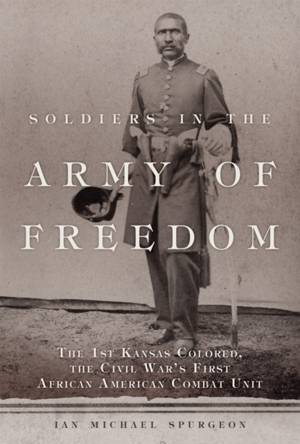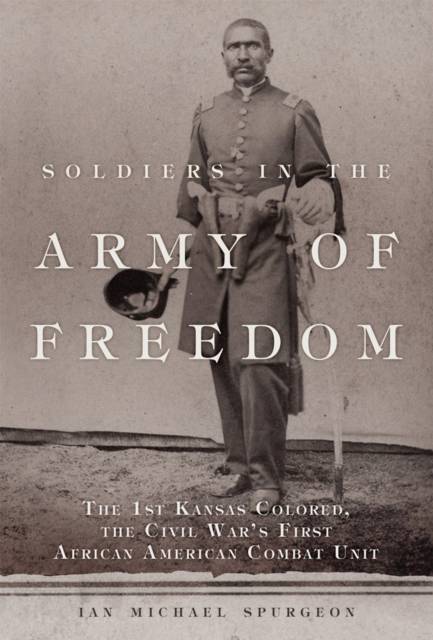
- Afhalen na 1 uur in een winkel met voorraad
- Gratis thuislevering in België vanaf € 30
- Ruim aanbod met 7 miljoen producten
- Afhalen na 1 uur in een winkel met voorraad
- Gratis thuislevering in België vanaf € 30
- Ruim aanbod met 7 miljoen producten
Zoeken
Soldiers in the Army of Freedom
The 1st Kansas Colored, the Civil War's First African American Combat Unit Volume 47
Ian Michael Spurgeon
€ 41,45
+ 82 punten
Omschrijving
It was 1862, the second year of the Civil War, though Kansans and Missourians had been fighting over slavery for almost a decade. For the 250 Union soldiers facing down rebel irregulars on Enoch Toothman's farm near Butler, Missouri, this was no battle over abstract principles. These were men of the First Kansas Colored Infantry, and they were fighting for their own freedom and that of their families. They belonged to the first black regiment raised in a northern state, and the first black unit to see combat during the Civil War. Soldiers in the Army of Freedom is the first published account of this largely forgotten regiment and, in particular, its contribution to Union victory in the trans-Mississippi theater of the Civil War. As such, it restores the First Kansas Colored Infantry to its rightful place in American history. Composed primarily of former slaves, the First Kansas Colored saw major combat in Missouri, Indian Territory, and Arkansas. Ian Michael Spurgeon draws upon a wealth of little-known sources--including soldiers' pension applications--to chart the intersection of race and military service, and to reveal the regiment's role in countering white prejudices by defying stereotypes. Despite naysayers' bigoted predictions--and a merciless slaughter at the Battle of Poison Spring--these black soldiers proved themselves as capable as their white counterparts, and so helped shape the evolving attitudes of leading politicians, such as Kansas senator James Henry Lane and President Abraham Lincoln. A long-overdue reconstruction of the regiment's remarkable combat record, Spurgeon's book brings to life the men of the First Kansas Colored Infantry in their doubly desperate battle against the Confederate forces and skepticism within Union ranks.
Specificaties
Betrokkenen
- Auteur(s):
- Uitgeverij:
Inhoud
- Aantal bladzijden:
- 456
- Taal:
- Engels
- Reeks:
- Reeksnummer:
- nr. 47
Eigenschappen
- Productcode (EAN):
- 9780806168791
- Verschijningsdatum:
- 9/02/2021
- Uitvoering:
- Paperback
- Formaat:
- Trade paperback (VS)
- Afmetingen:
- 152 mm x 229 mm
- Gewicht:
- 662 g

Alleen bij Standaard Boekhandel
+ 82 punten op je klantenkaart van Standaard Boekhandel
Beoordelingen
We publiceren alleen reviews die voldoen aan de voorwaarden voor reviews. Bekijk onze voorwaarden voor reviews.











